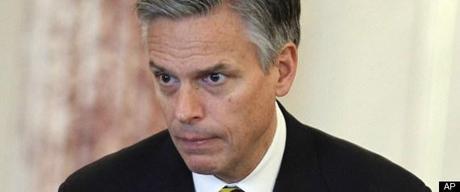 Daniel Larison writing for The American Conservative explains why Huntsman failed to gain any traction in the 2012 Republican primaries.
Daniel Larison writing for The American Conservative explains why Huntsman failed to gain any traction in the 2012 Republican primaries.
Republican rejection of Huntsman wasn’t because of his record on social and cultural issues, which was actually quite conservative and arguably more conservative on social issues than most of the Republican field that year. He wasn’t rejected because of the domestic agenda he proposed during his presidential run, which included economic proposals that satisfied The Wall Street Journal and his early endorsement of Ryan’s budget proposal. On almost every issue, Huntsman was as far to the right (conventionally defined) as his competitors, and sometimes he was to the right of almost all of them. No, he was mostly rejected on account of his non-confrontational style and diplomatic political persona, his support for withdrawing earlier from Afghanistan, and the fact that he was appointed ambassador to China by a Democratic president. If Huntsman had been judged on his record and the substance of what he was proposing to do, presumably many conservatives dissatisfied with the available choices would have rallied behind him. Of course, just the opposite happened. Hawks absurdly dismissed him as being “to the left” of Obama on foreign policy, and despite being the only Republican candidate with meaningful foreign policy experience he was written off because he failed to conform to everything that Republican hard-liners wanted. Huntsman’s experience is a reminder of the overwhelming, built-in opposition inside the party to any advocacy for foreign policy restraint, no matter how mild it may be.
More on Jon Huntsman here.
